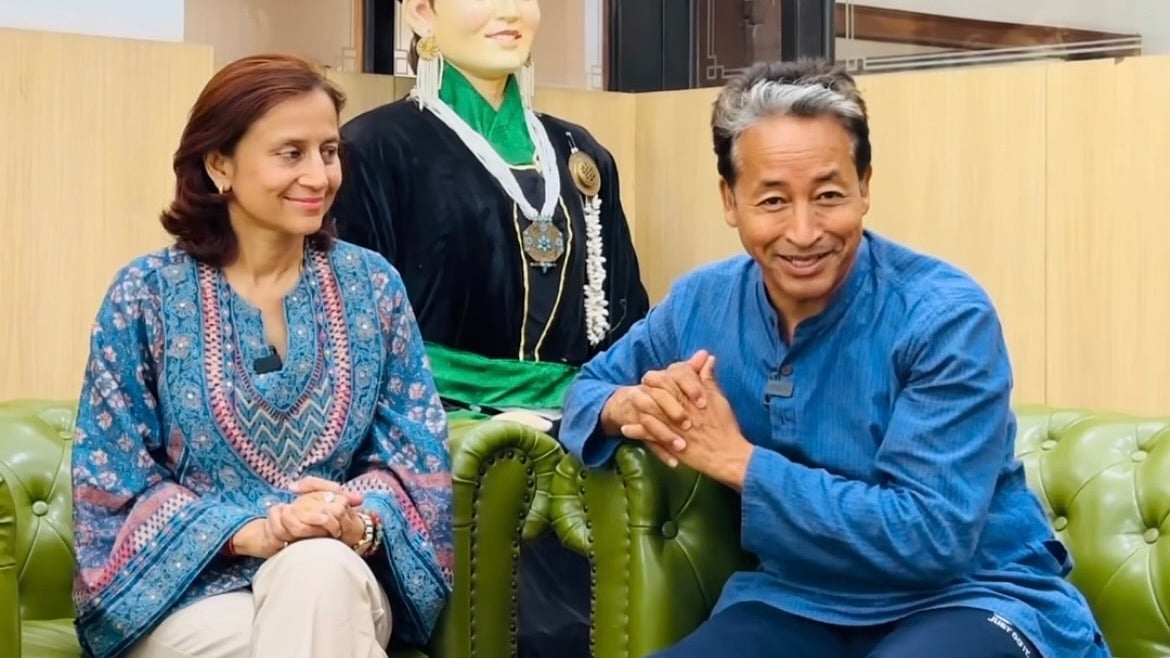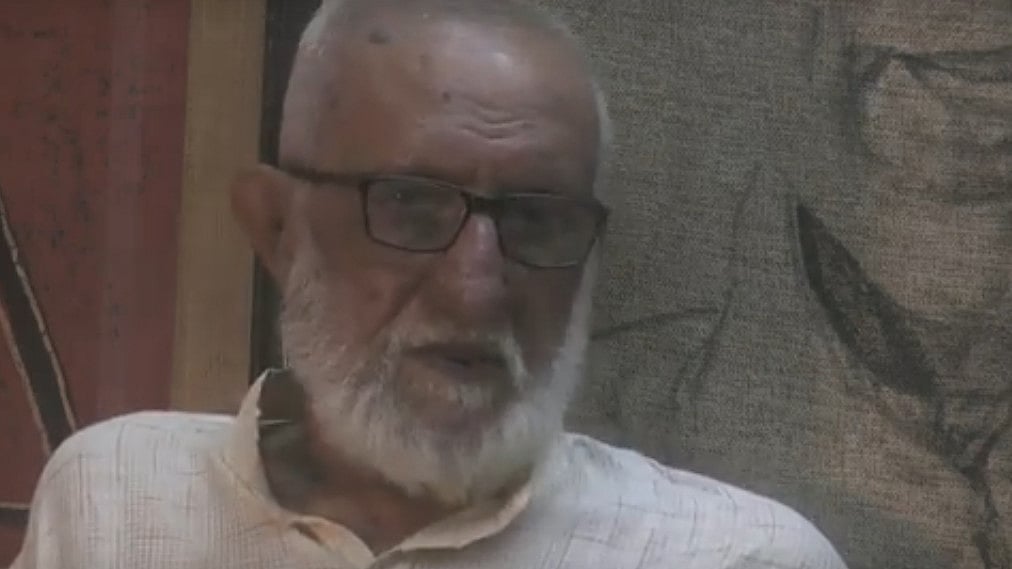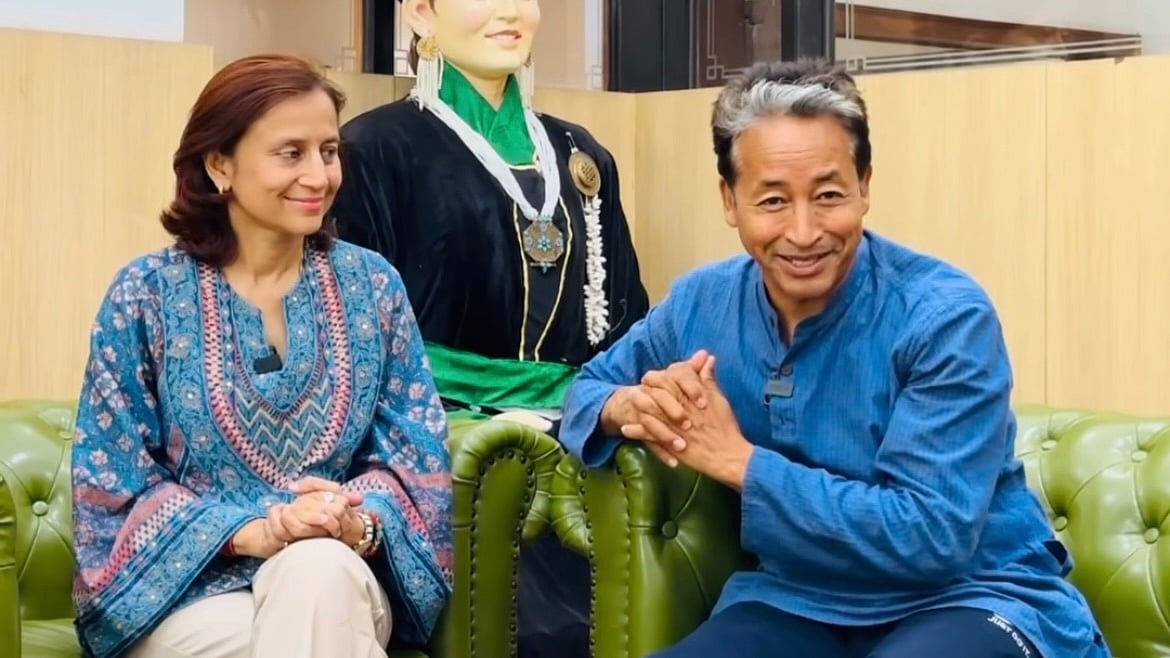Climate activist Gitanjali Angmo, Director of the Himalayan Institute of Alternatives, Ladakh, has emerged as a forceful voice for the people of her region. A Chevening scholar and social entrepreneur, she relocated to Ladakh in 2017 with the focus of creating a model of experiential learning whereby students are taught to tackle the challenges of climate change and to find sustainable solutions to the problems facing people living in this cold desert.
In the last five years, she has worked to create 150,000 sq ft of sustainable infrastructure and guided over 300 students to combine innovation with sustainable lifestyles. She is presently in the news speaking out forcefully for the release of her husband, climate activist Sonam Wangchuk, who was arrested under the NSA and flown to Jodhpur for leading a peaceful protest, demanding statehood for Ladakh and implementation of the Sixth Schedule.
Angmo has no hesitation in pointing out how her husband, a scientist by training, has spent the last two decades doing grassroots innovations suited to the unique environment of Ladakh. In 2005, Wangchuk was appointed as a member of the National Governing Council for Elementary Education in the Ministry of Human Resource Development. While working on innovative methods of primary education, he also spent time developing a prototype of an artificial glacier called the ‘Ice Stupa’ that could store the stream waters during the winters in the form of giant ice cones. The water would be released for agricultural purposes during late spring. This technology has been accepted by several countries in Europe, with Western scientists having travelled to Ladakh to study its efficacy.
Wangchuk has also been working to design zero-fossil fuel shelters, which will help conserve fuel for the Indian army. He has created a portable military tent weighing 30 kg that can accommodate ten jawans at a time and can be heated using solar panels. The tent has an insulator that surrounds the sleeping compartment and prevents heat from escaping the tent.
One of the reasons why this renewable energy tent has been successful is because Ladakh enjoys around 320 clear days per year and has an average daily global solar radiation of 2022 kWh/m2/annum. This means this region holds the potential to generate 35 GW from solar energy and 100 GW from wind energy. Wangchuk’s argument has been that indiscriminate solar projects being set up across Ladakh are undermining sustainable livelihoods, such as agriculture, herb cultivation and pashmina wool production, all of which are integral to this region. No other state can offer this kind of constant sunshine. The revocation of Article 370 saw the government green signal the construction of one of the world’s largest solar power projects, spanning nearly 158 sq km, three times bigger than the current largest one. Other energy projects are in the queue.
Land is at a premium in Ladakh because they have very little arable land, and the Ladakhi are worried that their scarce agricultural land should not be used to set up industries and factories. Angmo repeats what Wangchuk has been stating, that “development cannot just mean following the Western model of building big roads and factories. Leaders like Mahatma Gandhi and Sri Aurobindo spoke about self-sufficiency and local democracy. Unlike businessmen or politicians, who come for a few years, the locals have indigenous knowledge systems. The people of Ladakh must be asked what kind of development they want.”
A firm supporter of ahimsa, Wangchuk has used fasting as a means to persuade the government to grant Ladakh statehood as well as give it Sixth Schedule status. In March 2023, he and his followers undertook a five-day-long fast followed by a longer fast, which was followed later that year by a peaceful 1000 km-long march from Leh to New Delhi in September 2024 to try and persuade the government to accept their demands.
Angmo emphasises that the culture of Ladakh is very different from that of Kashmir and Jammu. The Ladakhi people’s biggest grievance is that they have little representation in the echelons of power. The present Lt Governor, Kulvinder Gupta, and the chief secretary are from Jammu with little experience on how to govern this ecologically sensitive region.
“The whole world talks about carbon neutral, but Ladakh is carbon negative. People talk about net zero, but we are net positive,” said Angmo, adding that “Sonam is an apolitical person who focuses on issues, and his focus is to preserve Ladakh’s unique socio-cultural ethos.”
Elaborating on her own work, she said that the HIAL has designed 1.8 lakh sq ft of passive solar heated structures in Ladakh, some of which are used by the army in the high-altitude cold desert, which save more than 4000 tonnes of carbon per month.
The HIAL had signed an MoU with several international universities, and more than 400 students have passed out doing various courses. “Our research has been adopted by the UT government (in Ladakh). Since last year, the ice stupa has been tendered and implemented across the region. Similarly, the new tourism policy has made passive solar heating mandatory for new hotels and commercial buildings,” she said.
Sonam Wangchuk, in an earlier interview, had told this correspondent, “With the Lt Governor deciding everything for us, the needs of the people are not given adequate attention. Ladakh receives an annual allocation of Rs 6000 cr, but more than half this money remains unused. The bureaucrats who come here are on a transferable job, and by the time they begin to understand this region, they get transferred.”
The government must not forget that Ladakh is ringed by Pakistan and China and has the Siachen Glacier to its north, which the Pakistani army is keen to regain. The Ladakhi Scouts form an integral part of the Indian army, and following their formation in 2000, they have won 300 gallantry medals and one Ashok Chakra and one Mahavir Chakra, apart from playing a crucial role in Operation Meghdoot, which gave India control over the Siachen Glacier.
Angmo is not willing to be silenced. She, like Wangchuk, stands equally committed to saving Ladakh’s unique environment and culture. Ladakhis are peace-loving people, but they are determined to stand by their values.
Rashme Sehgal is an author and an independent journalist.










